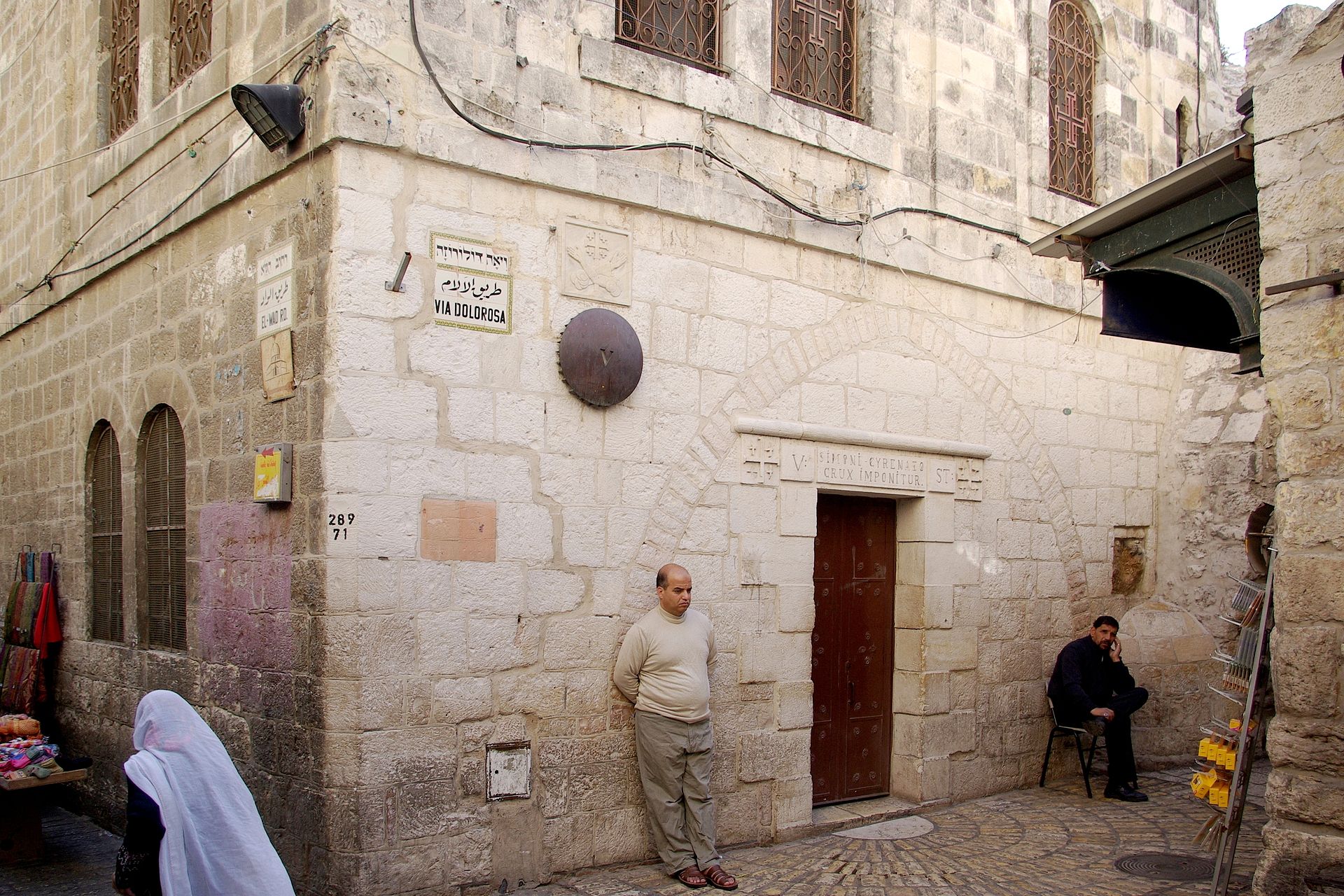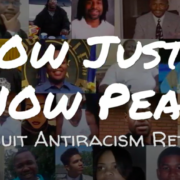Day 2: Choosing the Way of the Cross
The Gospel focuses us on a fundamental aspect of Christian life—making choices.

The Via Dolorosa in Jerusalem’s Old City is believed by many to be the path that Jesus walked on the way to his crucifixion.
Jesus sets before would-be-disciples a daunting choice: “If any want to become my followers, let them deny themselves and take up their cross daily and follow me.” Embrace of the cross leads to life, attempts to avoid it end in death. Following Jesus means to go the distance, walk the entire way, and walk it each day. This calls for unflinching self-scrutiny, reorienting our desires, re-scaling our values, re-centering our hopes, and embodying new habits and practices.
For some, the cross of martyrdom has and shall become a reality; but from most of us neither time, nor circumstance evoke such dramatic profession of faith. Rather, each day arrives with occasions for mercy-filled and other-oriented responses to the self-centered elderly relative or workaholic spouse, to the uncooperative co-worker or lonely and cranky student, to the inconsiderate motorist or agitated homeless person on the corner. Following Jesus finds no refuge in strict observance of rules, regulations, or doctrine, although this has a role in Christian life. Rather, following Jesus means to incarnate an attitude, a disposition, an openness, and a receptivity to the divine offer of grace actuated in loving service; it means taking up a new way of being in the world for God and for the flourishing of all God’s creation.
The Gospel focuses us on a fundamental aspect of Christian life—making choices. Jesus sets before would-be-disciples a daunting choice: “If any want to become my followers, let them deny themselves and take up their cross daily and follow me.” Embrace of the cross leads to life, attempts to avoid it end in death. Following Jesus means to go the distance, walk the entire way. and walk it each day.
Reflection Questions:
- Where did I meet the choice for life today? What was my response?
- What does it mean to be a follower of Jesus in a time of increasing global and national economic disparity and ideological polarization?
Dr. M. Shawn Copeland is Professor of Systematic Theology at Boston College. She is a former president of the Catholic Theological Society of America (CTSA), and a former Convener of the Black Catholic Theological Symposium (BCTS), an interdisciplinary learned association of Black Catholic scholars.
Professor Copeland is a prolific author, with more than 100 publications to her credit, including “Enfleshing Freedom: Body, Race, and Being” and “The Subversive Power of Love: The Vision of Henriette Delille.” She is the recipient of five honorary degrees as well as the Yves Congar Award for Excellence in Theology from Barry University, Miami, Florida, and the Distinguished Scholar Award from the Black Religious Scholars Group of the American Academy of Religion.
Dr. Copeland’s research interests include: 1) shifts in theological understanding of the human person and accords particular attention to body, gender, and race; 2) the African American Catholic experience, and 3) political or praxis based theologies.












Thank you for this – what I get from your words is that service gives us and opportunity to worry less about making the right choice and more about making different choices – reorientation isn’t a sin but a change. That’s all.
This is great! Here is an org doing a similar Lenten devotional with a focus on racial justice:
http://thetribe.la/index.php/2016/02/11/the-cross-shaped-battle-with-racial-injustice/
So, the way that I “translate” today’s reflection as a non-Christian is this: We need to strive to be true to ourselves – our authentic selves, the selves we were born/created to be – in everything we do. Whether or not we do that to please God or to follow Jesus, all of Creation will be the better for it, and thus we’re serving as good stewards of the Earth and all its inhabitants. And God, if she’s there as some cosmic being watching over us, will be pleased.
Peter: thanks for engaging with the message with Dr. Copeland’s post. We’re glad to hear that you found it valuable.
ISN
With regard to the second question, my struggle is to strive for and witness to justice for the marginalized, in a loving and charitable way. There is so much ideological polarization that it’s difficult not to respond to anger with anger, or respond to certitude with certitude.
Thanks, Earl, for the good reminder to engage our dialogue partners with love and charity.
ISN
Where did I meet the choice for life today? What was my response?
Working in a middle school there are ENDLESS temptations to turn away from life – the student that tries your nerves, the coworker who didn’t sleep enough last night, the missed lunch, or the cancelled class that means extra work for you. Today though, one place I encountered the choice for life was in an interaction with a student, C was being sent out of class and she was INDIGNANT that the teacher had ‘lied on her’ and that she ‘hated this school’. Now, it’s not my job necessarily to work with this student, but I saw (and heard!) her as I was leaving my office. I could have walked away and not engaged, I could have said something glib or flip, but instead I chose to simply listen, to sit with C’s frustration and to give her my ears patiently and without judgment. Not miraculous, but a small thing with great love.
Thanks for sharing about your response to a difficult situation, Christine. Your “small thing with great love” matters!
– ISN
Agreed. This is what I struggle with sometimes: making the flip or glib response, and not being patronizing, especially with middle schoolers who are just finding their voice but haven’t learned the best way to use it. I often regret that I had been able to control myself better when my children were young and tried my patience.
There’s a special place in heaven for people who work in middle schools. Thank you. 🙂